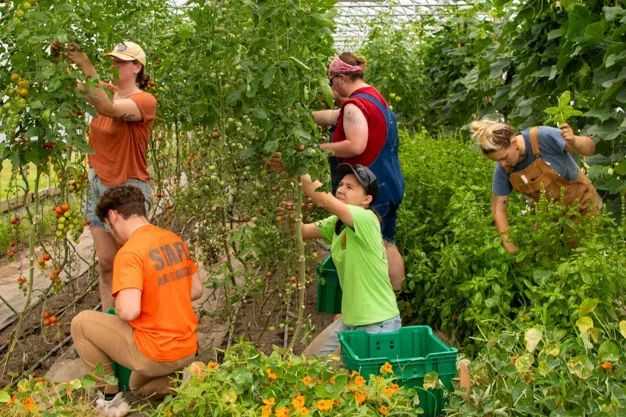Driving through the rolling, densely forested mountains of West Virginia and into the valley where Wardensville (population 379) lies, it's surprisingly tough not to stop. Maybe the life-sized red cow-with-a-cowboy-hat sculpture at the Lost River Trading Post catches your eye. Or those umbrella-topped picnic tables near the Wardensville Garden Market beckon. Or you might have heard about Mack's Bingo Kitchen and its crispy, juicy chicken sandwich.
Since 2016, this Appalachian town has been revivified by a nonprofit called Farms Work Wonders (FWW). The businesses above—plus Lewis Farm, Mack's Bingo Bakery, and Dakota Glass Works—fall under the expanding FWW canopy, which aims to grow everything from veggies to the area's economy. The group's primary focus, though, is supporting local youth.

Around the area, Yandura had often heard this sobering refrain: "Young people want to leave; there's nothing for them to do. We can't do anything. We've tried." But Yandura—who'd run a consulting firm and had major community organizing experience (he helped the 1994 White House form a gay-and-lesbian outreach office)— appreciated a challenge. Friend and philanthropist Jonathan D. Lewis visited them, offered the support of his foundation (now called the Jonathan D + Mark C. Lewis Foundation), and encouraged "taking a risk."
In 2016, FWW started with a farm and outdoor stand that employed five local adults and five youth. Initially, they sold potatoes, beets, okra, and herbs at a roadside stand. They didn't have to teach the fundamentals of farming in Appalachia, but the organization emphasized organic and regenerative practices like crop rotation, minimal tillage, and using multiple-season extension structures to help its three-quarters of an acre produce year-round. This year, Lewis Farm will grow some seventy-five varieties of food and flowers, including chef favorites such as ginger, turmeric, and specialty peppers.
Read more at gardenandgun.com
